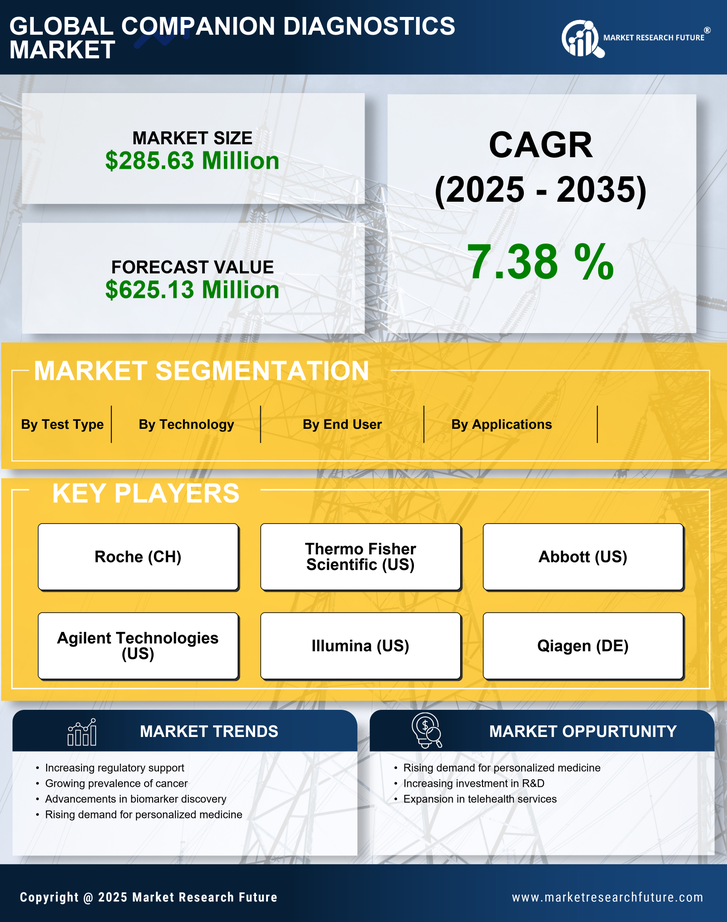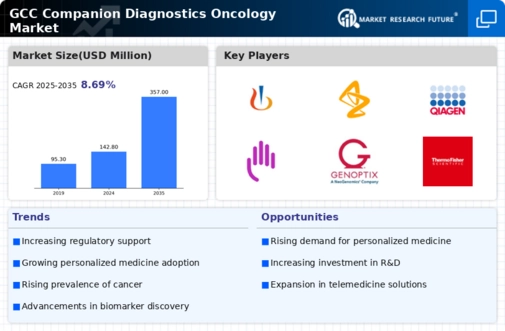Increasing Cancer Incidence
The rising incidence of cancer in the GCC region is a primary driver for the companion diagnostics-oncology market. As cancer cases continue to escalate, the demand for precise diagnostic tools that can tailor treatment options to individual patients becomes more pronounced. According to recent statistics, cancer rates in the GCC have shown an upward trend, with projections indicating a potential increase of 20% in the next decade. This surge necessitates the integration of companion diagnostics to enhance treatment efficacy and patient outcomes. The companion diagnostics-oncology market is thus positioned to grow significantly as healthcare providers seek to implement targeted therapies that align with specific genetic profiles, ultimately improving survival rates and quality of life for patients.
Rising Healthcare Expenditure
Healthcare expenditure in the GCC is on the rise, driven by a combination of factors including population growth, increased prevalence of chronic diseases, and a focus on improving healthcare quality. This upward trend in spending is positively impacting the companion diagnostics-oncology market, as healthcare providers allocate more resources towards advanced diagnostic tools. Recent reports indicate that healthcare spending in the region is projected to reach $100 billion by 2027. This increase in investment is likely to enhance the availability and accessibility of companion diagnostics, ultimately leading to better patient management and treatment outcomes in oncology.
Regulatory Framework Enhancements
The regulatory landscape for companion diagnostics in the GCC is evolving, with governments implementing frameworks that support innovation and streamline the approval process. Recent initiatives aim to facilitate the introduction of new diagnostic tests, thereby fostering a conducive environment for the companion diagnostics-oncology market. Regulatory bodies are increasingly recognizing the importance of these diagnostics in enhancing treatment efficacy and patient safety. As a result, the approval timelines for companion diagnostics are expected to shorten, encouraging more companies to invest in research and development. This regulatory support is likely to stimulate market growth, as it enables faster access to innovative diagnostic solutions for healthcare providers.
Advancements in Genomic Technologies
Technological advancements in genomic sequencing and analysis are propelling the companion diagnostics-oncology market forward. Innovations such as next-generation sequencing (NGS) and liquid biopsy techniques are enabling more accurate and efficient identification of biomarkers associated with various cancers. These technologies facilitate the development of companion diagnostics that can predict patient responses to specific therapies, thereby optimizing treatment plans. The GCC region is witnessing increased investments in genomic research, with funding reaching approximately $500 million in recent years. This influx of resources is likely to enhance the capabilities of companion diagnostics, making them indispensable tools in oncology practice and driving market growth.
Growing Awareness of Precision Medicine
There is a notable increase in awareness regarding precision medicine among healthcare professionals and patients in the GCC. This growing understanding emphasizes the importance of personalized treatment approaches, which are inherently linked to the companion diagnostics-oncology market. Educational initiatives and outreach programs are contributing to this awareness, leading to a higher demand for diagnostic tests that can inform treatment decisions. As healthcare systems in the GCC evolve, the integration of companion diagnostics into clinical practice is becoming more prevalent. This shift is expected to drive market growth, as stakeholders recognize the value of tailored therapies in improving patient outcomes and reducing healthcare costs.

















